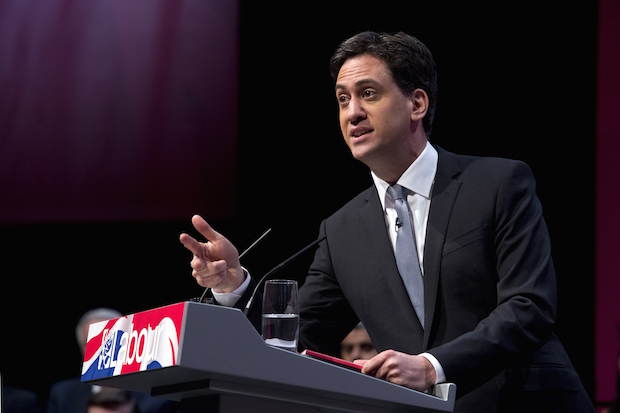Ed Miliband gave a good, forceful, well-received speech at Labour’s manifesto launch this morning. It couldn’t have been anything else, given how close we are to polling day. There were some very well-delivered moments, particularly when it came to zero hours contracts and non-doms. The peroration was particularly energetic, with the Labour leader saying:
‘Over the last four and a half years, I have been tested. It is right that I have been. Tested for the privilege of leading this country. I am ready. Ready to put an end to the tired old idea that as long as we look after the rich and powerful we will all be OK. Ready to put into practice the truth that it is only when working people succeed, that Britain succeeds.
‘If you elect me as your Prime Minister in just over three weeks’ time: I will work for that goal. I will fight for that goal. Every single day. In everything I do. In every decision I make. I know Britain can be better. The British people know Britain can be better. Together, let’s make it happen.’
He has certainly sent his party off to sell the manifesto in good cheer, cracking jokes during the question-and-answer session and giving the impression that he is, to borrow his wife’s phrase, up for this fight.
But the question is whether the centrepiece of this launch, the pitch for Labour to be more fiscally credible than the Tories, is the right fight to pick. Labour is behind the Tories on the economy. It only has 24 days to catch up. Is raising the salience of an issue on which the party is behind with so little time to go too much of a gamble?
Miliband had a good line when he said that ‘you can’t fund the NHS with an IOU’, but even that reminds us of the note that Liam Byrne left for his successor in the Treasury. And the reason the Tories can get away with these IOUs is that they poll ahead on the economy, and therefore voters think that when the Conservatives promise something to do with money, they’ll deliver it. Perhaps that trust is misplaced, but we are where we are and it is risky for Labour strategists to hope that things move on this.
The biggest cheers Miliband received were for his promise on zero hours contracts, his attack on non-doms, and his promise to repeal the Health and Social Care Act. The response of Labour activists is obviously not the same as the response of people on the doorstep. But it does suggest that these are the issues they’ll be talking about with the most animation on the doorstep in the coming days. And perhaps those activists are right, because those issues undermine the claims to success of the Conservatives on issues where voters do not trust them: the sense that they stand for the few not the many, that they are the party of the rich and that they cannot be trusted with the NHS.
It will be interesting to see whether Labour really sustains its fiscal credibility attack beyond today, or whether it feels as though it has ticked that box and offered an admirable attempt at neutralising the issue and so can move back to those other issues that received so much applause in the hall.







Comments